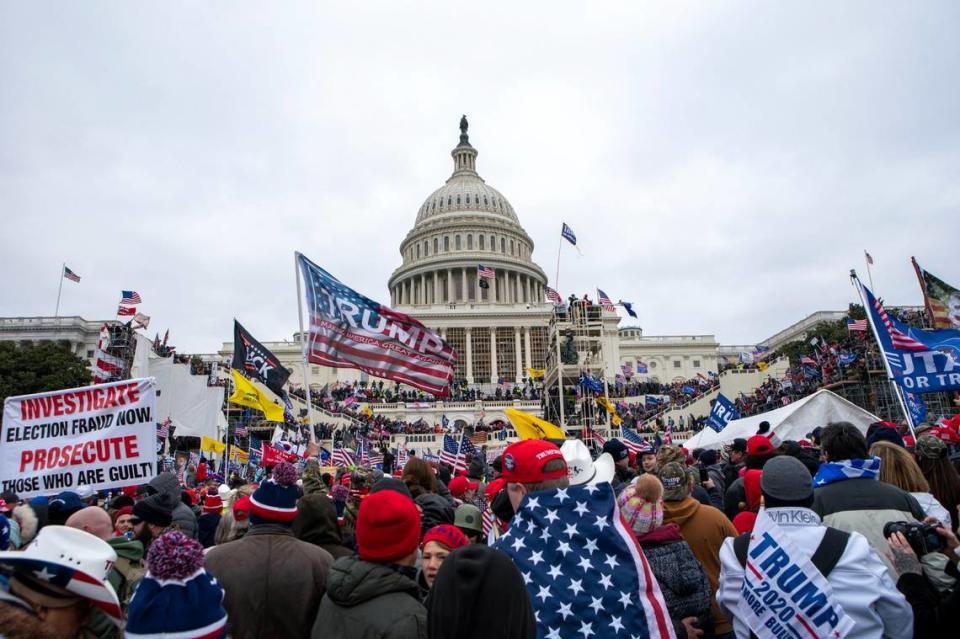Supreme Court will hear NC case with 2024 presidential election implications
The U.S. Supreme Court agreed Thursday to hear a North Carolina case with nationwide implications — on whether state legislatures should be immune from judicial oversight in state court when it comes to setting election rules.
The arguments put forth by North Carolina’s Republican-led legislature concerned a controversial topic known as the “independent state legislature doctrine.”
While the matter before the Supreme Court stems from a gerrymandering lawsuit in North Carolina, critics said the argument could be used in any state, for a variety of purposes — like overturning the results of future presidential elections. The basic premise is that there should be few checks and balances when it comes to election law. State legislatures should have near-total control over the rules, the theory says, without state courts being allowed to decide if a state’s elections laws are constitutional.
The N.C. Supreme Court harshly shot down the argument earlier this year, in its ruling in the gerrymandering case.
“It is also repugnant to the sovereignty of states, the authority of state constitutions, and the independence of state courts, and would produce absurd and dangerous consequences,” the state’s highest court wrote.
The N.C Supreme Court has a Democratic majority. But the U.S. Supreme Court has a conservative majority which could see things differently, GOP leaders in North Carolina hoped — even though previous versions of the U.S. Supreme Court have also shot down the argument over the decades, and as recently as 2015.
Republican lawmakers told the U.S. Supreme Court that they believe the Constitution intends for legislative leaders, not the courts, to have the final say over elections law — “and this Court should intervene to protect the Constitution’s allocation of power over this matter of fundamental importance to our democratic system of government.”
The court’s announcement Thursday was not a ruling on the argument itself, but rather an agreement to hear the case — likely in time for a ruling before the 2024 presidential election.
Details of the argument
The theory “would give state legislatures wide authority to gerrymander electoral maps and pass voter suppression laws,” wrote The Brennan Center for Justice, a think tank that advocates for voting rights. “It has even been used as political cover to try to overturn elections.”
Thursday’s decision is a big win for Republicans, since it gives the court’s conservative majority a chance to formally enshrine the theory. The court has shot it down when it has come up in the past, including as recently as 2015, but its political makeup has shifted to the right since then.
Since the theory says state legislatures have near-total control over elections law, some critics say it means Republican-held legislatures in states that vote for a Democrat for president in 2024 might be able to use it to ignore the popular vote and give their Electoral College votes to the Republican candidate instead.
Some GOP leaders tried doing exactly that in 2020. And while it didn’t work then, Republicans may try it again in 2024, wrote Michael Luttig, a Republican federal judge who is retired from the 4th Circuit Court of Appeals, which covers North Carolina, in April.
“Trump’s and the Republicans’ far more ambitious objective is to execute successfully in 2024 the very same plan they failed in executing in 2020 and to overturn the 2024 election if Trump or his anointed successor loses again in the next quadrennial contest,” wrote Luttig — who previously clerked for Antonin Scalia, an early proponent of the theory.

However, not everyone agrees that it would create a direct path forward to overturning elections in the future, even if the Supreme Court does greenlight the theory.
“Even if the Court endorses the doctrine, it would not mean state legislatures could choose to ignore the popular vote in their state and appoint presidential electors themselves,” wrote Richard Pildes, a constitutional law expert at New York University School of Law.
Pildes said it could still do things like give legislators more power to hold politically motivated audits to attempt to change the results of an election — like what the Trump campaign unsuccessfully attempted in Georgia and Arizona in 2020 — but that strategy would likely take a while, unlike sending in different electors, he wrote, opening the door for lawsuits and other efforts to stop it.
What it means for NC specifically
While national observers have been watching this case for its implications on future presidential elections, the case itself deals with the more local issue of gerrymandering and whether the N.C. Supreme Court should have the ability to overturn political district maps as being in violation of the state constitution.
That’s what happened early this year, when the state’s highest court ruled that Republican lawmakers had drawn maps to artificially inflate their own voters’ political power at the expense of Democratic voters.
It violated the “free elections” clause in the state constitution, said the court’s opinion, which came down along party lines with all the Democratic justices voting to strike down the districts and all the Republican justices saying the districts should have been allowed to stay.
GOP leaders appealed to the U.S. Supreme Court arguing the theory of the independent state legislature doctrine. They lost their attempt to have the case heard before this year’s primary elections. But even though the justices declined to do that, they still had the option to hear the case in general. And that’s what they ruled on Thursday.
